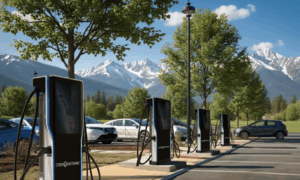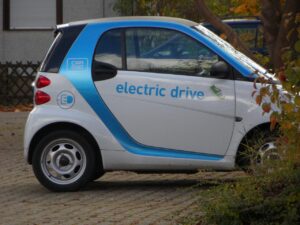
Home / EV Charging News / Optimal EV Charging Times: Day vs. Night
As electric vehicles (EVs) become increasingly popular, the question of when to charge them is more relevant than ever. Charging an EV isn’t just about plugging it in; it’s about making the most out of the charging process by choosing the right time. The decision to charge during the day or at night can impact your electricity costs, the load on the power grid, and even the environment. In this article, we will explore the benefits and drawbacks of both daytime and nighttime charging, helping you determine the optimal time to charge your EV.
Charging your EV during the day offers several benefits, particularly if you have access to public charging stations or your own renewable energy source. Let’s take a closer look at why daytime charging might be the best option for some EV owners.
One of the most significant advantages of charging during the day is the ease of access to public charging stations. Many workplaces, shopping centers, and parking facilities offer EV charging points that are typically less congested during the day compared to the evening. If you’re someone who spends a significant amount of time away from home, daytime charging can be a convenient way to ensure your vehicle is always ready for the next journey.
For those with solar panels installed at home, daytime charging can be particularly advantageous. Charging your EV during peak sunlight hours allows you to harness clean, renewable energy directly from your solar panels. This not only reduces your reliance on the grid but also cuts down on electricity costs, especially in regions with high daytime electricity rates. Moreover, by using solar energy, you contribute to a lower carbon footprint, making your EV even more environmentally friendly.
Charging during the day can also help you avoid contributing to peak energy demand periods. While this may seem counterintuitive, in some areas, the highest energy usage occurs in the evening when people return home from work and begin using appliances. By charging during off-peak hours, you can avoid higher electricity rates and reduce the strain on the grid, potentially even benefiting from lower tariffs if your region offers time-of-use (TOU) pricing.
Nighttime charging, on the other hand, has its own set of advantages, particularly for those who charge their EVs at home. Let’s explore why charging your EV overnight might be the better option for you.
One of the most compelling reasons to charge your EV at night is the potential for lower energy costs. Many utility companies offer time-of-use (TOU) pricing plans, which charge lower rates during off-peak hours—typically late at night. By scheduling your EV to charge overnight, you can take advantage of these reduced rates, significantly lowering your electricity bill.
Charging at night also benefits the power grid. Overnight, when most people are asleep, energy demand is generally lower, meaning the grid experiences less strain. By charging your EV during these off-peak hours, you help balance the load on the grid, which can be especially important as more people adopt electric vehicles. This reduced load can also help utilities better manage energy distribution, leading to a more stable and reliable power supply overall.
For those who have the option to charge at home, nighttime charging offers unmatched convenience. You can simply plug in your vehicle before going to bed and wake up to a fully charged battery in the morning. Additionally, charging at night often provides a more secure environment, as your car is safely parked at home rather than in a public or less secure location.
Choosing the optimal time to charge your EV depends on several factors, including your electricity plan, driving habits, and environmental considerations. Here’s a breakdown of what to consider:
To make the best decision on when to charge your EV, consider the following points:
In conclusion, the optimal time to charge your EV—day or night—depends on a variety of factors, including your energy pricing plan, daily routine, and environmental concerns. Both options offer distinct benefits, and the best choice ultimately depends on your individual circumstances. By carefully considering your charging habits, you can maximize efficiency, reduce costs, and contribute to a more sustainable future. Whether you choose to charge during the day or at night, making an informed decision will ensure that your EV remains a convenient and eco-friendly mode of transportation.



